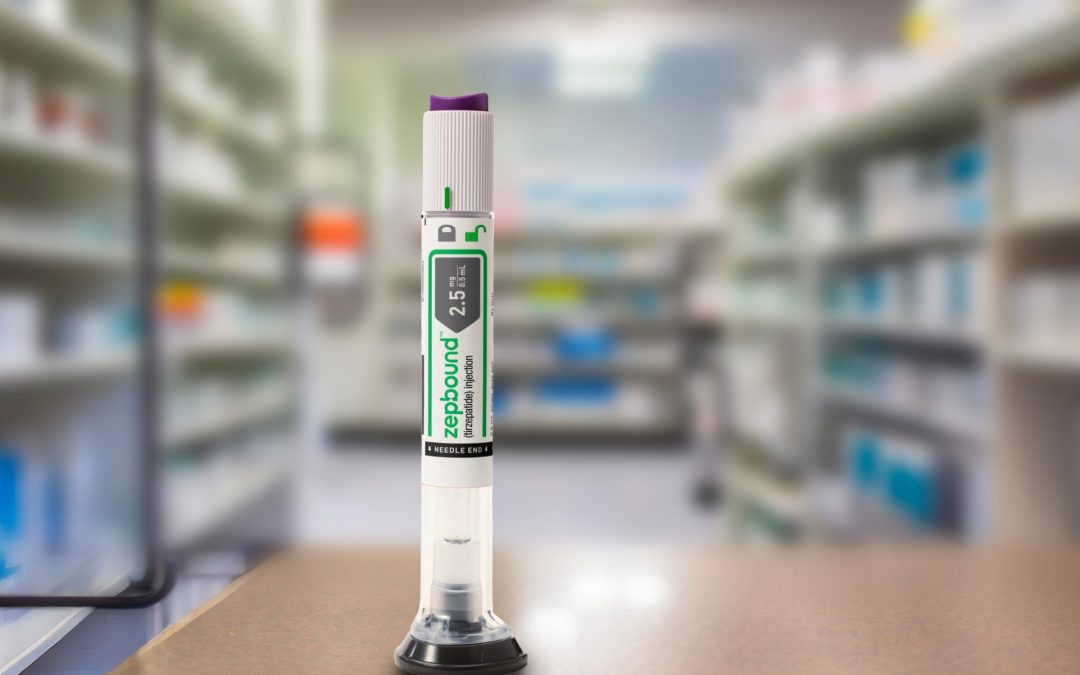Mounjaro is a medication used to treat type 2 diabetes, and was FDA approved and widely available in the United States in May 2022. The drug’s active ingredient, tirzepatide, has also been used off-label to treat obesity. In November 2023, the FDA approved a weight loss version of the drug, called Zepbound, which also contains tirzepatide. Zepbound is intended for adults who are overweight or obese (BMI at least 30) and have at least one weight-related condition.
Mounjaro/Zepbound has proven to be effective for many patients. However, like all medications, it comes with a range of potential side effects. Understanding the range of potential side effects, their duration, and management strategies can significantly improve your experience with Zepbound. In this blog, we’ll explore the side effects of Zepbound, discuss how long these side effects may last, and provide tips on managing them effectively.
This blog will discuss:
- Possible short-term side effects of Zepbound
- Possible long-term side effects
- Tips for managing individual side effects
What’s the Difference Between Zepbound and Mounjaro?
The only difference between the weight loss medications Monjauro and Zepbound lies in their prescribed use: Monjauro is typically prescribed for treatment of type 2 diabetes, while Zepbound is primarily prescribed for managing obesity or overweight conditions. Both medications function similarly in aiding weight loss, but the deciding factor for their prescription is the underlying reason for treatment.
Common Zepbound Side Effects
Side effects of Zepbound can range from mild to severe. Common side effects include:
- Nausea and Vomiting
- Diarrhea
- Fatigue
- Headaches
Managing Nausea and Vomiting
These are among the most frequently reported side effects and can be particularly distressing. Here are some tips to manage these symptoms:
- Eat Small, Frequent Meals: This can help keep your stomach settled and prevent it from becoming too full or too empty.
- Stay Hydrated: Drink plenty of fluids, such as water, herbal teas, and clear broths.
- Avoid Triggers: Certain foods and smells can trigger nausea. Identifying and avoiding these triggers can help reduce symptoms.
- Medications: In some cases, your doctor may prescribe anti-nausea medications.
Addressing Diarrhea
Diarrhea is both uncomfortable and inconvenient. It can lead to dehydration and other complications if not managed properly. Consider these strategies:
- Hydration: Drink fluids with electrolytes, such as sports drinks or oral rehydration solutions.
- Diet: Eat a bland diet, including foods like bananas, rice, applesauce, and toast (the BRAT diet).
- Medication: Over-the-counter antidiarrheal medications can be helpful, but consult your healthcare provider before use.
Dealing with Fatigue
Fatigue can be a challenging side effect, affecting your daily life and activities. Here’s how to manage it:
- Rest: Ensure you get plenty of sleep and take naps if necessary.
- Nutrition: Eat a balanced diet rich in fruits, vegetables, and lean proteins.
- Exercise: Gentle exercise, such as walking or yoga, can help boost energy levels.
Managing Headaches
Headaches can range from mild to severe. Here are some ways to alleviate them:
- Hydration: Dehydration is a common cause of headaches. Drink plenty of water.
- Rest: Sometimes, simply resting in a dark, quiet room can help.
- Medication: Over-the-counter medications like acetaminophen (Tylenol) or ibuprofen can help alleviate headaches.

Addressing Diarrhea
Diarrhea is both uncomfortable and inconvenient. It can lead to dehydration and other complications if not managed properly. Consider these strategies:
- Hydration: Drink fluids with electrolytes, such as sports drinks or oral rehydration solutions.
- Diet: Eat a bland diet, including foods like bananas, rice, applesauce, and toast (the BRAT diet).
- Medication: Over-the-counter antidiarrheal medications can be helpful, but consult your healthcare provider before use.
Dealing with Fatigue
Fatigue can be a challenging side effect, affecting your daily life and activities. Here’s how to manage it:
- Rest: Ensure you get plenty of sleep and take naps if necessary.
- Nutrition: Eat a balanced diet rich in fruits, vegetables, and lean proteins.
- Exercise: Gentle exercise, such as walking or yoga, can help boost energy levels.
Managing Headaches
Headaches can range from mild to severe. Here are some ways to alleviate them:
- Hydration: Dehydration is a common cause of headaches. Drink plenty of water.
- Rest: Sometimes, simply resting in a dark, quiet room can help.
- Medication: Over-the-counter medications like acetaminophen (Tylenol) or ibuprofen can help alleviate headaches.
Zepbound Long-Term Side Effects
Fortunately, most side effects with Zepbound are short-term, but it’s also important to be aware of potential long-term side effects of Zepbound. These can include:
- Bone Health: One potential unwanted consequence of losing considerable weight is that not all of the lost weight comes from fat; some portion of it usually comes from bone and muscle. Therefore, long-term use of Zepbound may impact bone density, and contribute to osteopenia and osteoporosis. Adequate calcium and vitamin D intake along with muscle strengthening and weight bearing exercises can reduce the impact on bone and muscle.
- Cardiovascular Effects: Weight loss can have many very important cardiovascular health benefits. However, one negative cardiovascular effect with Zepbound can be an increased heart rate. Regular check-ups and a heart-healthy lifestyle, outlined for you by your healthcare provider, are important for mitigating risks.
- Organ Damage: Prolonged use of Zepbound may affect organs such as the pancreas, gall bladder, liver and kidneys.
How Long Do Zepbound Side Effects Last?
The duration of Zepbound side effects varies among individuals. Some patients may experience side effects only for a few days after the first dose or with the first several doses, others may continue to have symptoms for a longer period. It’s important to communicate with your healthcare provider about any persistent or bothersome side effects.
Is Zepbound Safe?
Determining the safety of Zepbound involves considering both its benefits and potential risks. While many patients experience significant improvements in their conditions, others may face challenges due to side effects. It’s essential to have an open dialogue with your healthcare provider to assess whether Zepbound is the right choice for you.
Consulting with Healthcare Providers
Regular consultations with your healthcare provider are crucial when taking Zepbound. Your provider will monitor your condition, adjust dosages, and address any side effects you may experience. Never hesitate to report any new or worsening symptoms.
Alternative Medications
If Zepbound’s side effects become unmanageable, there may be alternative medications available to treat your condition. Your healthcare provider can discuss these options with you and help find a treatment plan that works best for your individual needs.
Lifestyle Adjustments
Making lifestyle adjustments is an important part of any weight loss plan and can further help manage Zepbound side effects. Consider these changes:
- Diet: Eating a balanced diet can support overall health and mitigate some side effects. Consult with your dietitian for the diet plan that’s best for you.
- Exercise: Regular physical activity can improve energy levels and overall well-being. Consult with your healthcare provider before starting any new exercise regimens.
- Stress Management: Techniques such as meditation, yoga, and deep-breathing exercises can help manage stress and improve your overall quality of life.
Zepbound can be an effective medication for many patients, but it’s important to be aware of the potential side effects and how to manage them. By staying informed, consulting with healthcare providers, making necessary lifestyle adjustments, and staying in frequent communication with your healthcare provider, you can better navigate any challenges that may arise. Remember, your health and well-being should always be the priority.

